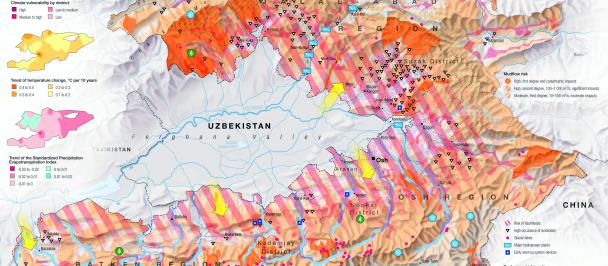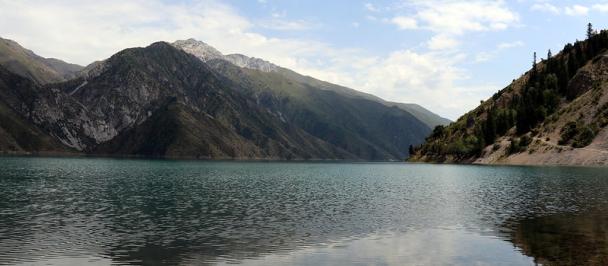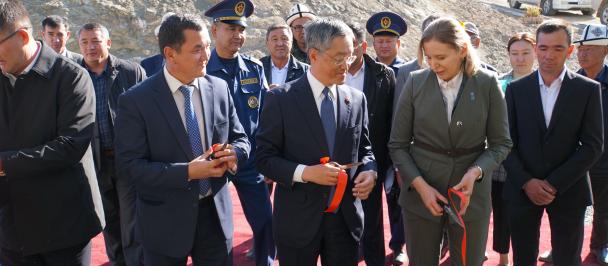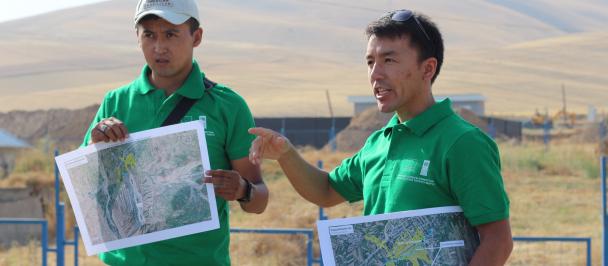8:15AM. The working morning begins with a change of shift with hopes that it will be a calm day for the residents of the area. Firefighters know that no fire is predictable, and that no working days are normal. But they don't know for sure what kind of heartache or danger they will face. Will they be able to spot the burned man among the smoke in the corner of the charred room, and escape the flaming debris of the crumbling ceiling falling though? Will they save lives? Will they receive a grateful hug from the saved?
This is how every working morning of our hero, senior officer Alimbekov Almazbek Abdylakimovich begins. Together with colleagues, they check their readiness and state of health in order to be prepared for any challenge.
For 20 years of service, Almazbek Alimbekov participated in major rescue operations and saved many lives. Now he is a senior officer of his department and directs the fire brigade in the specialized fire and rescue unit No.13 of the Ministry of Emergency Situations in the city of Osh.
Almazbek Alimbekov recalls that heroic films about the military inspired him to choose the job. “Since childhood, I wanted to serve in the army and defend my homeland. It really interested me, so I worked hard to achieve my dreams.” he says.
The duties of firefighters include not only extinguishing fires, but also rescuing people in different situations and environments. It happens that firefighters are afraid during rescue operations too. Sometimes mentors have to lead their younger colleagues and give them support.
"When I first started out, I was a young firefighter. There were experienced senior officers from whom I learned a lot from and reach new heights. And now, too, we do not allow newcomers to immediately rush into the fire as they need to be gradually prepared both physically and mentally."
Firefighters rarely get to rest: each guard has its own daily routine and tasks are scheduled from morning to evening. “We conduct both theoretical and practical classes every day with new lessons each time. We are engaged in physical training. We go through first aid trainings. We are constantly learning and improving.” says the firefighter.
Responsiveness and teamwork play an important role in the work of firefighters.
The first thing to do when receiving a call is to assess the scale of the fire. We look at the scale of smoke and flames. If the fire is large, we may need help of a second squad. Upon arrival at the place, if there are people at the site, our main task is to save them. If not, then we save documents or things valuable to people.
The cause of a fire can be negligence in everyday life and human negligence is often to blame. In most cases, these are electrical appliances, people forget to turn off. It happens that small children are left unattended and playing with matches. It happens that some people mistakenly think that they can put out a fire on their own or are afraid that they can be fined, and then the flame gets bigger. Most frequently, fires occur in private houses and during the winter, in apartment buildings.
Each shift has a team of seven people on guard duty. Each person has their own responsibility: one is responsible for coordinating the team, the second for the service ability of the equipment, and so on.
Our equipment is not new, it was delivered 30 years ago. We check it every day, as it often breaks down. My comrades and I ourselves monitor and, if necessary, repair. If some details are missing, then we turn on ingenuity and become masters ourselves, because these details have not been produced on the market for a long time. Unfortunately, the service life of our equipment is long expired.
In order to significantly improve the quality of work of fire services in the framework of cooperation between the Ministry of Emergency Situations of the Kyrgyz Republic, the Korean International Cooperation Agency (KOICA), the Government of the Republic of Korea and the United Nations Development Programme, construction of a new fire and rescue station is underway in the city of Osh. UNDP will equip it with latest fire-fighting equipments. Firefighters' working conditions will also be improved on the basis of gender equality, universal access to fire services and principles of sustainable development.
Our profession is very difficult, but important. When we work, we put our lives at risk, but we put out fires and save lives. More often than not, we have to act according to the situation, and after each extinguishing we make a thorough analysis of the process of extinguishing the fire, learn from the lessons and learn from our own experience.
Firefighting and rescue personnel have to cope with the work in a short time, because human life is at stake. The level of stress that they can get in the process of working in critical conditions requires psychological attention and care in order to optimize the psychological state of each person, because his life can forever be divided into "before" and "after". A fire and rescue officer must be provided with support and resources, but this is not easy, especially in the absence of opportunities.
We provide psychological help to each other ourselves, as we do not have a full-time psychologist. It is natural if our comrade experienced difficult emotions during the elimination of a severe fire and rescue of burnt people - these are normal reactions to a critical situation for him, especially if he is new. We create opportunities for ourselves to maintain not only physical, but also mental health and help our comrades to get through traumatic situations. As per resources, the ability to survive difficult challenges and be ready to respond to new ones, it would be great to get the help of a psychologist. But we do not have such an opportunities, so we have to cope on our own.
There are no two identical fires. Fire itself is an unpredictable happening. Over the years of service, the most significant and memorable work for Almazbek Alimbekov was extinguishing a fire in a 4-storey building on Zainabetdinov Street in 2008.
When we made our way through all the smoke, there was an elderly man lying unconsciously in a serious condition. My colleague and I carried him out of the fire and provided first aid, and later handed him over to an ambulance. Then we even became heroes of the “Echo Osh” newspaper.
According to Almazbek Alimbekov, the daily work routine takes up most of the shift of firefighters. And after work, like the rest, they spend time with their family. “The family, of course, is very worried about me. But they support me and are proud of me.” he says.
The day-to-day work of firefighters may never make it to the primetime news or the front page, earn a medal, or even a thank you. But these dedicated people will be back to work tomorrow, ready to break through the wall of flames if need be, simply because they are, and this is what they do to save others.

 Locations
Locations


